
15 minute read
Feature
Making a retreat
Captain Lynley Oliver unveils a new space at William Booth College A N exciting initiative is taking shape at William Booth College: a new retreat centre will open later this year.
William Booth College is a centre for learning and spiritual formation. The learning aspect is shared with the territory in a variety of ways, but the aim is to share some of the spiritual formation opportunities as well. Therefore, the retreat centre will be open to you!
House 9, which originally served as accommodation for cadets, is currently being transformed into an urban oasis of serenity. The house has been repurposed several times over the years, but our vision is to provide a permanent space that is well utilised by all.
It has been designed to bring the outside inside, with a consistent nature theme throughout. The plan is to create a space that enables people to open themselves up to God. We are confident that those who visit the retreat centre will easily experience a sense of tranquillity.
The builders are hard at work on the 36-bed facility, which will feature 3 floors of twin en-suite rooms, a conference room on the ground floor, a prayer room, a fully operational kitchen and a breakout area. The aesthetically pleasing spaces will not only look and feel good, but also be a safe place to all who want to use the centre, whether for individual or structured retreats.
An individual retreat will be available to anyone at any point, provided there is availability and a booking is made in advance. It will provide independent space for anyone to use the available resources in a self-directed way, with the option to commence with led prayers in the morning.
Structured retreats will provide a space for people to come together in groups at particular points of the year and be guided in retreat by some great leaders. These will include Lieut-Colonel Wendy Caffull, Majors Kath and Melvyn Jones, Commissioners Carol and Ivor Telfer, Tony Horsfall (author of Working From A Place Of Rest and A Fruitful Life) and Margaret Silf (author of At Sea With God and Sacred Spaces). Dates of these planned and structured retreats are being released soon. To keep up to date we encourage you to join our mailing list by sending an email to WBCretreat@salvationarmy.org.uk or by going to our Facebook page: WBC
Retreat Centre SA. Our aim is to make this facility available to as many people as possible, so we are also
offering the space for group, corps and divisional retreats. If you have been searching for a suitable location for your corps to have a retreat, William Booth College could be the place! It would be entirely up to the retreat’s organisers whether we provided someone to lead it; you would also be welcome to find someone yourself. Self-catering is an option or food can be provided.
However you might wish to use the centre, we will do our best to accommodate your plans. It will be important to us to talk through these with you so that the space and facilities will be just what you need. Feel free to call 020 7326 2700 and ask to speak to Captain Lynley Oliver to discuss your requirements. Any rates charged will be competitive and we will be happy to present these to you once we are able to determine your needs.
We look forward to welcoming you to the WBC Retreat Centre and we are grateful to God for making it possible to share this beneficial resource. ‘‘ Our vision is to provide a permanent space that is well utilised by all ’’

Creating dedicated spiritual leaders
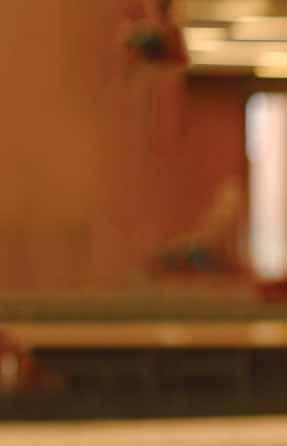
Lieut-Colonels Mike and Wendy Caffull talk to Lieut-Colonel Jonathan Roberts about William Booth College’s work today
WILLIAM Booth Memorial Training College – now known as William Booth College or WBC – was officially opened on 8 July 1929. Ninety years later Salvationist asked Principal Lieut-Colonel Mike Caffull and Assistant Principal and Personnel Officer Lieut-Colonel Wendy Caffull about the college today.
WHAT WERE YOUR REACTIONS WHEN YOU WERE APPOINTED TO WBC IN 2014?
MIKE: It came out of the blue and was a complete shock! We had a call while on holiday then went for an interview with the Territorial Commander, who explained what the expectations were. We feel privileged to have been here for five years and thoroughly enjoy working alongside a really wonderful staff team. WENDY: We thought it was way beyond us, which, looking back, was great because it meant we came to the roles totally relying on God and believing he would equip us. Having said that, I think every previous appointment has prepared us in some way for our ministry here.
WHAT DO YOUR ROLES INVOLVE?
MIKE: I give the strategic lead for all the operations of the college, working with excellent directors who take responsibility for specific areas. It means chairing lots of meetings and trying to bring a cohesive approach to all that is offered through the four areas of work: the School for Officer Training, the School for In-Service Training and Development (SISTAD), the Candidates Unit and the Business Services Unit. A key part of my role is in relation to the training of cadets; Wendy and I hold regular interviews with each of them and I am involved in leading and preaching at a number of spiritual days throughout the year. I also deliver lectures as part of the cadets’ leadership module. WENDY: My role is very much people focused, which is brilliant for me. I have responsibility for all the personnel aspects in relation to college officers and for engaging with and encouraging staff, cadets and visitors. My main focus, however, is the overall spiritual life of the college. That includes the co-ordination of all the college’s worship activities, such as planning the spiritual days that happen once a month, Covenant Day – that very significant day when cadets sign their Officer’s Covenant – Commissioning Day, farewells and welcomes.
HOW HAS TRAINING CHANGED SINCE YOU WERE CADETS?
MIKE: The essence of what the college does has not changed. It still aims to provide the territory with dedicated spiritual leaders. But the process by which we go about it has changed quite considerably. There is a much more reflective process now. Cadets are expected to learn from experiences, articulate that learning and then put it into action in their placements. There are still classes, of course, and we are affiliated with a university for the diploma course that almost everyone works on. There are fewer cadets these days, which is very sad, but with smaller numbers there are greater opportunities for personalised training. We work hard to adapt what we do to meet the specific needs of individuals. WENDY: There is a plaque in the grounds that cadets walk past every day. It has been there since the college opened. It says: ‘By love serve.’ It is a constant reminder of the outworking of their call to officership. Although training has changed significantly since I was a cadet, that foundational calling has not.
WHAT DO CADETS LEARN AT WBC?
MIKE: The easiest way to sum it up is in three words: knowing, being and doing. ‘Knowing’ involves academic study in subjects such as Scripture, doctrine and leadership. ‘Doing’ is the practical work in helping them to develop in their leadership ready for when they are officers. Among other things they have preaching placements and serve a variety of ministry scenarios around the territory. A strong emphasis is given to the ‘being’ element, which is the formation of who they are in Christ and who they need to be as leaders. Spiritual formation runs throughout the whole programme. On the academic side there are assignments that are assessed and the Diploma in Salvation Army Officership includes reflections on their spiritual growth. There aren’t many university courses that would put those things together.
WENDY: Cadets have to complete a large reflective piece of work four times during their college life that involves responding to the areas of ‘knowing’, ‘being’ and ‘doing’. The review council meets to discuss these submissions to understand the heart of where the cadets are and how they’re developing. In response to this review and evaluation the cadets set goals for the next six months to help them grow and develop.
HOW DO YOU EXPECT CADETS TO DEVELOP DURING TRAINING?
WENDY: I want to see cadets grow in their love for the Lord, develop their understanding of Scripture, doctrine, mission and much more. Their participation in, and learning of, new spiritual disciplines helps them develop in their walk with the Lord. Cadets also take on a Personal Initiative Project. They choose what kind of missional project they’re going to do but we encourage them to do something that’s outside their comfort zone. It’s a learning experience and it gives them great fulfilment as they step out to do new things. MIKE: We expect their knowledge and leadership abilities to increase dramatically. All candidates for officership are assessed on a set of eleven different competencies, eight of which are consistently measured during training and throughout officership. The vast majority of cadets do develop significantly in these areas over the two years.
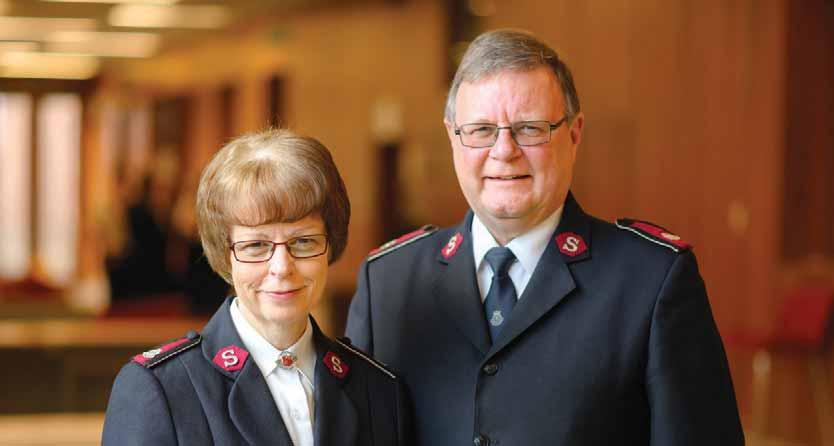
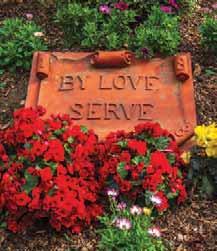
CAN YOU SAY SOMETHING ABOUT THE WORK OF SISTAD?
MIKE: SISTAD looks after many development and learning opportunities that we provide for officers and employees. More than 2,000 study places per year are taken up at WBC. Those are for courses that are held here, but SISTAD offer courses all across the territory as well. Two degree courses are offered and there are many professional development courses. We also have open learning courses that anyone can do.
The college supports officers through the early years of ministry – not just during the two years of residential training, but also in a personal development programme with the Candidates Unit prior to college and during the first five years of their officership with SISTAD. That’s a minimum of eight years of learning and development provided by WBC.
WHAT IMPACT DOES WBC HAVE ON THE WIDER COMMUNITY?
WENDY: We try to be outward facing. So, for example, at Christmas we hold carol services in Ruskin Park and Camberwell Green. Lots of people come, however cold and snowy it is! MIKE: A number of cadets do their Personal Initiative Project in the community around the college, for example, with the chaplaincy at King’s College Hospital. It is part of their engagement with people outside college life and it is much encouraged as far as we are concerned. It has an impact on them but it is also our opportunity to have an impact on society outside the walls.
WHAT DO YOU HOPE WILLIAM BOOTH WOULD SAY ABOUT HIS COLLEGE TODAY?
MIKE: William Booth wanted to create ‘a university of humanity’ to prepare people for ministry and leadership in our Army. He might be hugely disappointed with the comparatively low numbers of cadets, but thrilled at the inclusivity and wide range of learning that goes on here. William Booth was a pragmatist, wanting to provide what was needed for his day, so I hope he would be pleased that we are trying to be relevant to the needs of today’s culture. WENDY: I hope William Booth would say he was pleased with the quality of officers who leave WBC and who live out their calling in the communities to which they are sent, loving God and loving their people.
TAKING THE GOSPEL TO THE

To mark Founders’ Day on 2 July, Basil Canvin (Guisborough) looks back at William Booth’s innovative motor campaigns W ILLIAM Booth was an evangelist at heart and was always looking for more effective ways of ‘reaching the masses’. If people would not enter a church building, but were more comfortable with a theatre, then he held his meetings there – the design of the Army’s early citadels was more theatrical than church-like. Songs were sung to secular tunes and not everyone looked on the introduction of brass bands in religious services positively. The spirit of General Booth’s Army was one of infinite ingenuity. And so, at the beginning of the 20th century, he turned to the motor car!
In his late seventies the General was involved in a great evangelistic adventure. He described how the germ of an idea came to him in 1900: ‘The first time the notion occurred to me was at Banbury… The whole place appeared to me to come out to see me... so I thought if I could get about quickly from place to place – especially to those places it was not physically possible to reach by train – it would be a source of legitimate pleasure to the people and advantageous to the Kingdom. The motor car suggested itself as the readiest method.’
At the time the car was not a reliable means of transport over long distances. Breakdowns and punctures were not infrequent and garages were few and far between; drivers had to be their own mechanics. The quality of major roads had deteriorated since the decline of the coaching industry and minor roads could be dangerous. The average petrol consumption was 14mpg and petrol had to be bought from chemists or blacksmiths in two gallon cans; petrol pumps did not appear until 1913. Travelling in open vehicles also meant passengers were exposed to the vagaries of British weather.
After much detailed planning of routes, stopovers and timetables, and advanced publicity to local authorities and the police, the campaign was ready to begin. On the evening of 8 August 1904 the General and his party left London on the midnight express for Penzance. The next day they were to start the motorcade at St Just, a few miles from Land’s End, and finish in Aberdeen, a journey of 1,224 miles. It would take 29 days and the General would speak at 36 open-air gatherings. There were also to be 74 indoor meetings with a total attendance of nearly 100,000. He would be on the road for six days of each week.
The journey was not without its hazards. The General had to change cars twice because of breakdowns. The start of the day’s journey from Stroud



1907 1906
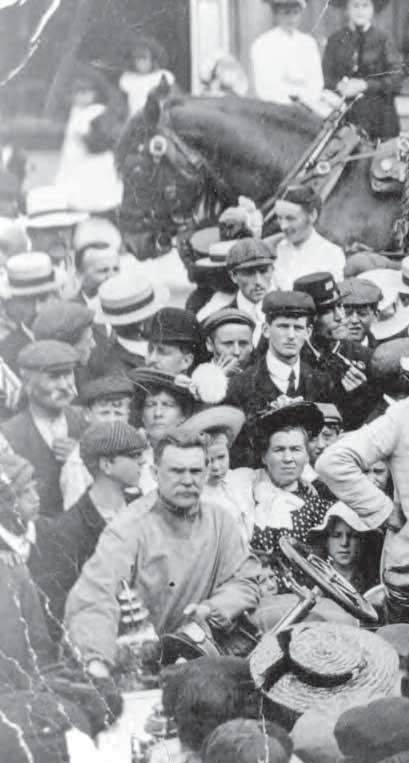

was delayed by mechanical problems. Punctures interrupted the journey and on two occasions there were problems with petrol supplies.
At Warrington an umbrella had to be provided to shield the General ‘from the fierce rays of the sun’ during an open-air gathering, but adverse weather conditions were more normal. There were two periods of prolonged heavy rain, although this did not seem to lessen the enthusiasm of the crowds.
On day 25 a dangerous situation occurred between Dunblane and Crieff. The War Cry reported: ‘Within 20 minutes the General’s car was flooded, waterproofs were soaked and a rug, lent by a reporter, might as well have been dipped in the ocean. While the pilot car was negotiating a hill, the rain, which had been of a drizzling nature, suddenly came down in sheets of water blinding the occupants. As a result they ran into a bank and, but for the presence of mind of the driver, there might have been a
HIGHWAYS AND BY WAYS

1904


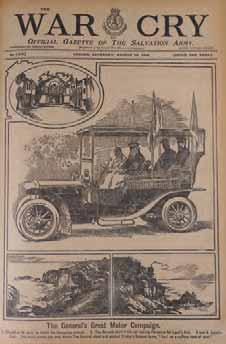
serious accident.’ Two cars got ‘stuck up’ in the hills and had to abandon the journey for that day.
From the beginning the journey caught the imagination of the public. At Great Ayton the head teacher of a Quaker school sent a senior pupil on his bicycle to intercept the General and ask him to stop and address the pupils. When the cars arrived 350 pupils were assembled on the village green. He spoke to them of his early life and said: ‘If you start life with God, who knows what glory you may bring to his name!’
On two occasions, in small towns, the crowds blocked the road and the General spoke to them from his car before they cheered him on his way. In larger towns and cities the police controlled the thousands of people who lined the streets and filled the market places and town squares.
The largest public buildings available were hired and filled to capacity. Invariably the General was greeted by the mayor and corporation, and official addresses of welcome were read by the town clerks. The MP for Guisborough, Herbert Samuel, declared: ‘The General’s tour was a progress kings might envy.’
The General seems to have been happiest when he was addressing working men and women at the factory gates or meeting coal miners as they ‘‘ On two occasions, in small towns, the crowds blocked the road and the General spoke to them from his car before they cheered him on his way ’’

waved their lamps and doffed their caps. In Aberdeen, after receiving an ‘address from a large number of fish girls’, he commented that he was ‘more at home with fish girls than earls and countesses’, which caused great laughter.
It was half past six in the evening when the pilot car sighted Scotland’s Granite City on day 29. The 76-year-old General had completed a staggering achievement, probably beyond anyone’s expectations.
Despite advancing years and the rigorous demands of travel, six more campaigns were conducted, crisscrossing the country. In 1906 and 1908 they began in Scotland, and in 1907 a longer campaign spent 12 days in Wales. Two campaigns finished in spectacular fashion: in 1905 the General appeared in his car on the platform at a rally in the Royal Albert Hall, and in 1908 he was drawn by a team of officers through the north nave of the Crystal Palace’s central transept. In 1909 a journey had to be abandoned because of the General’s eye condition. He completed his last crusade in 1911 at the age of 82.
Samuel, chairing a meeting at Guisborough, stated: ‘I do not think that history records... the life of a religious leader who carried on his work for so long a period and over an area so vast as the General has done.’







